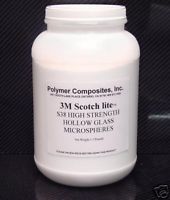3M™ Scotchlite™
Hollow Glass Microspheres
Low Density Epoxy Filler
1.5 Pounds Net Weight
Approximately 1 Gallon in Volume
3M™ Glass Bubbles are engineered hollow glass microspheres that are alternatives to conventional fillers and additives such as silica, calcium carbonate, talc, clay, etc., for many demanding applications.

For ordering and inquiries please call 877-403-8008.
Or visit our eBay Store, PolymerProducts.
Description
S38-HS 3M™ Scotchlite™ are engineered hollow glass microspheres (also known as microballoons that are inert fillers typically incorporated with an epoxy resin to lower its density and improve buoyancy, process sanding, dimensional stability and reduce shrinkage. This unique low density filler is used in a wide range of industries to reduce part weight, lower costs and enhance mechanical properties. The unique spherical shape of Scotchlite glass bubbles offers a number of important benefits including higher filler loading with minimal viscosity increase, reduce exothermic temperatures for large castings while minimizing shrinkage and warping of the casted part.
Add this low density filler to an epoxy resin system and create what is known as a “SYNTACTIC FOAM” in the composite materials industry. Syntactic foams are commonly used as light-weight adhesives and casting materials that demonstrates improved chemical resistance. It can its typically used as a low density coating, a tooling compound or as a dimensional stable casting resin for composite parts fabricating.
Cured cast parts are typically buoyant in water also yields higher dimensional stability, improved machining and sanding and low porosity. The microspheres are hollow glass bubbles thus creating a very strong foam systems with closed cells. This will yield a low porosity integral skin that provides moisture resistance as well as low gas permeability over a wide service temperature.
Materials that have a specific gravity greater than water will sink and materials that have lower specific gravity will float.
| Comparative Material | Apparent Density |
| Density of Base Unfilled Epoxy Resin | 1.10 Grams per Cubic Centimeter |
| Density of Epoxy 30% Filled With Microspheres | 0.85 Grams per Cubic Centimeter |
| Density of Water | 1.00 Grams per Cubic Centimeter |
The addition of the microspheres improves the weight to strength ratio and other physical properties of the epoxy system such as:
· Lower cost per unit volume
· Higher compressive strength
· Improved dimensional stability
· Improved electrical properties
· Improved machinability
Physical and Mechanical Properties
| TYPICAL DENSITY GRAMS PER CUBIC CENTIMETER | THERMALCONDUCTIVITTY( | ISOSTALIC CRUSH STRENGTH | PARTICLE SIZE
Using a 10 gram sample on a U.S. number 140 standard sieve (105 microns), a maximum of three (3) percent by weight glass bubbles will be retained on the sieve. |
|||
| 0.38 grams per cubic centimeter | 0.127(W·m-1·K-1) at 70°F (21°C)) | 90% @ 5500 PSI | DISTRIBUTION
|